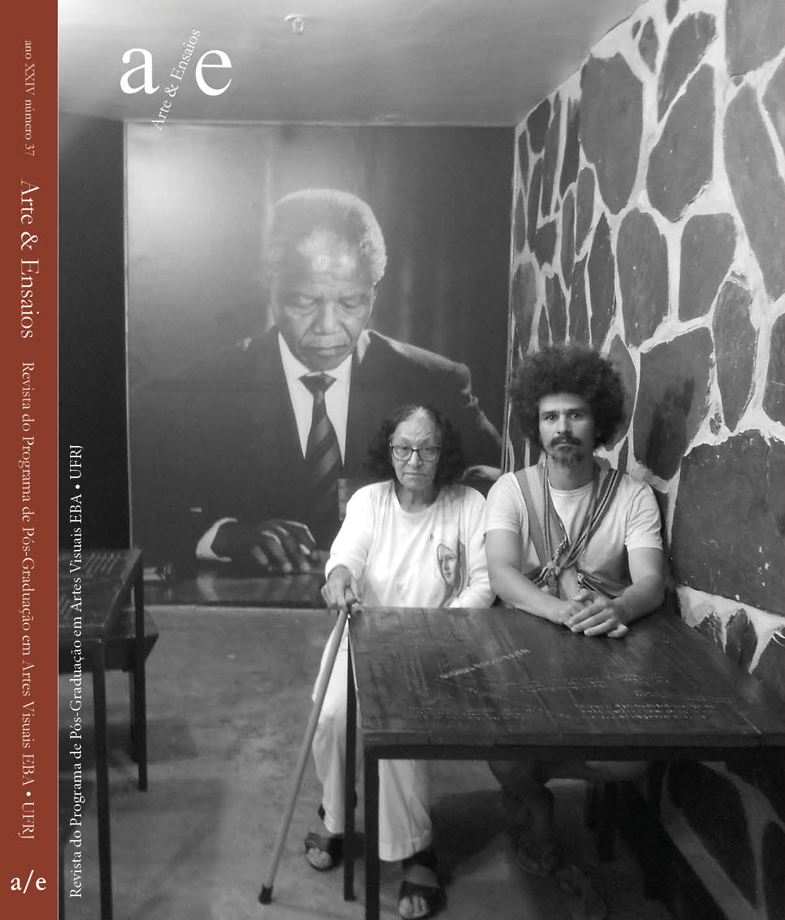Afrofuturismo e o devir negro do mundo | Afrofuturism and the becoming-black of the world
DOI:
https://doi.org/10.37235/ae.n38.26373Resumo
O artigo situa algumas reflexões sobre práticas de decolonização do saber no contexto afro brasileiro. Alerta sobre um possível esvaziamento de termos e teorias, concentrando a atenção no movimento afrofuturista lido em conjunto com o debate sobre o que define afropolitanismo.
Versão ampliada deste artigo foi publicada com o título "Afrofuturismo e Perspectivismo Ameríndio: duas ferramentas para um pensamento decolonial" no portal BUALA: http://www.buala.org/pt/a-ler/afrofuturismo-e-perspectivismo-ameri-ndio-duas-ferramentas-para-um-pensamento-decolonial
Downloads
Referências
BIKO, S., 1978. I write what I like, Einemann Educational Publisher, Johannesburg;
BOSCH SANTANA, S., 2013. Exorcizing Afropolitanism, Africainwords blog;
BUARQUE DE HOLANDA, S., 1995. Raizes do Brasil, Companhia das Letras;
BUROCCO, L., 2018. Pólos criativos de Colonialidad no Sul | Creative hubs of coloniality in the south, Tese (doutorado) – Universidade Federal do Rio de Janeiro, Escola de Comunicação, Programa de Pós-Graduação em Comunicação e Cultura, 2018, 254pp;
_____________, 2019. Do not make Africa an object of exploitation again, in Black Panther and Afrofuturism themed edition, Image & Text, University of Pretoria;
BWESIGYE, B., 2013. Is Afropolitanism Africa’s New Single Story, Aster(ix) Journal;
CARLI de MORAES E., 2018. O AFROFUTURISMO É POP — Os filmes “Pantera Negra” e o álbum-visual “Dirty Computer” de Janelle Monáe agem como um terremoto cultural que afrofuturiza os rumos da Cultura Pop, Medium;
COMAROFF, J., COMAROFF J.L., 2012. Theory from the South: Or, how Euro-America is Evolving Toward Africa, Reutledge Ed.;
CORBETT, J., 1994. Extended Play: Sounding Off from John Cage to Dr. Funkenstein. Durham, NC: Duke University Press;
DABIRI, E., 2014. Why I am not Afropolitan, Africa is a Country;
DERY, M., 1994. Black to the Future, em Flame wars the discourse of cyberculture. Durham, NC: Duke University Press, 1994;
ESHUN, K., 1998. More Brilliant Than the Sun: Adventures in Sonic Fiction. Londres: Quartet Books;
EZE, C., 2014. Rethinking African culture and identity: the Afropolitan model, Journal of African Cultural Studies, 26:2, 234-247;
FALK, T., 2013. Africa is the world’s fastest growing continent, ZDNet;
FANON, F., 1963. The Wretched of the Earth, Pinguin books;
GNIPPER, P., 2018. Conheça o afrofuturismo, gênero artístico que mescla cultura africana com sci-fi, canaltech;
GUERREIRO, A., 2018, entrevista com Achille Mbembe, Africa a Ultima Fronteira do Capitalismo, Revista Publico;
HABILA, H., 2013. We Need New Names by NoViolet Bulawayo – review, The Guardian;
IMANI, NIKITAH O., 2012. The Implications of Africa-Centered Conceptions of Time and Space for Quantitative Theorizing: Limitations of Paradigmatically-Bound Philosophical Meta-Assumptions, Black Studies Faculty Publications. 8;
MATOS GONDIM, D., 2019. Manifesto Quilombola, Arte&Ensaio, n. 37 (2019);
MBEMBE, A., 2007. ‘Afropolitanism’, in Simon Njami and Lucy Durán (eds.), Africa Remix: Contemporary Art of a Continent, Johannesburg: Jacana Media, pp 26–30 traduzido pelo português por Cleber Daniel Lambert da Silva in Áskesis | v. 4 | n. 2 | julho/dezembro - 2015| 68 – 71;
MOMBAÇA, J., 2019. Descolonización como apocalipses, Terremoto;
MORAIS, P.F, 2018. A Bienal de Berlim declarou guerra, Revista Publico;
NGOZI ADICHIE, C., The Danger of a Single Story, TEDGlobal 2009;
KRENAK, A., 2015. Ailton Krenak organização Sergo Cohn, Rio de Janeiro, Azogue;
ODUSOLA, A., 2018 . Africa’s Economic Growth Prospects Amongst the World’s Brightest, Internet Press Service New Agency;
OGBECHI, O., 2008. Afropolitanism — Africa without Africans disponivel online no blog AACHRONYM Global African Arts with a focus on art-equity and cultural patrimony http://aachronym.blogspot.com;
PITHOUSE, R., 2017. Manichean Delirium (In the Time of Jacob Zuma), The Com;
PORCIDONIO, G., 2017. A força está com os afrofuturistas, ProjetoColabora;
SAID, E., 1983. Traveling Theory, in The World, the Text, and the Critic, Harvard University
Press;
SELASI, T., 2005. ‘Bye-Bye Babar’, in The Lip;
The Economist, 2013. Africa, The Hottest frontier;
The Wall Street Journal, 2011, Africa A new gold rush;
TVEIT M., 2013. The Afropolitan Must Go, disponivel online em Africa is a Country;
WAINAINA, B., 2012. “I am a Pan-Africanist, not an Afropolitan” paper apresentado na African Studies Association UK 2012.
Downloads
Publicado
Edição
Seção
Licença
Autores que publicam nesta revista concordam com os seguintes termos:- Autores mantém os direitos autorais e concedem à revista o direito de primeira publicação, com o trabalho simultaneamente licenciado sob a Licença Creative Commons Attribution que permite o compartilhamento do trabalho com reconhecimento da autoria e publicação inicial nesta revista.
- Autores têm autorização para assumir contratos adicionais separadamente, para distribuição não-exclusiva da versão do trabalho publicada nesta revista (ex.: publicar em repositório institucional ou como capítulo de livro), com reconhecimento de autoria e publicação inicial nesta revista.
- Autores têm permissão e são estimulados a publicar e distribuir seu trabalho online (ex.: em repositórios institucionais ou na sua página pessoal) a qualquer ponto antes ou durante o processo editorial, já que isso pode gerar alterações produtivas, bem como aumentar o impacto e a citação do trabalho publicado (Veja O Efeito do Acesso Livre).


